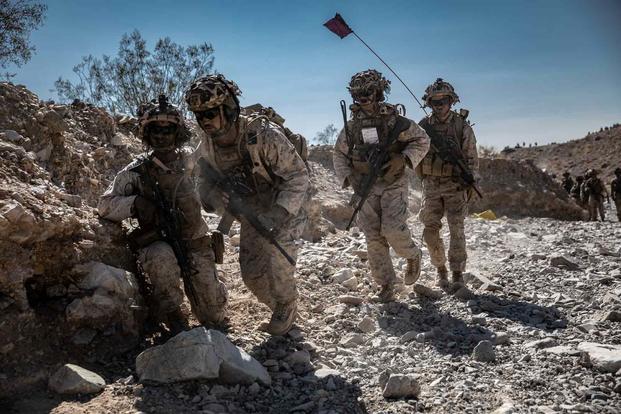The Marine Corps has rolled out a sweeping plan to change the way it trains and educates Marines with the goal of getting them ready for combat faster as part of the service's modernization efforts.
In a report released Tuesday, the Corps' top officer, Commandant Gen. David Berger, wrote that a 2018 review found a variety of issues with the service's training and education approaches that led him to conclude that "the current ... system is not preparing the Marine Corps for the future operating environment."
Lt. Gen. Kevin Iiams, head of the Marines' Training and Education Command, told reporters Tuesday that the plan will mean getting away from "rote, repetitive training" and using new technology and resources to offer more practical and engaging classes and exercises.
One example of the changes in store for Marines is a "more offensively minded" advanced rifle qualification course where, instead of focusing on marksmanship and using paper targets, Marines will engage with robot targets in more realistic situations, Iiams said. It's something the service has worked on for years, but leaders now want to apply it to all Marine training.
While revamping rifle training speaks to the very heart of being a Marine, the Corps' top leaders also have larger innovations in their sights, as well. Both Iiams and the report make mention of "Project Tripoli," a plan that would allow different units to train together across various locations in a digital environment.
"Imagine a young lance corporal ... at Twentynine Palms, he's got some type of ocular system on that is a blended-reality system and as he is executing his attack," Iiams explained, "he looks up and he can see an F-35, that's actually being flown from a simulator on the East Coast, that is being driven into this synthetic system that he's got."
Another advantage of this modernized system, Iiams explained, is that units in the field would get feedback on how they're doing immediately, instead of having to wait days, "so for the next portion of the exercise, they're getting better as they move through the entire evolution."
Some of the changes -- like a greater emphasis on rigorous swimming training -- are being made with a future war in the Pacific in mind. Yet the Marine leaders who spoke with reporters Tuesday also noted that the current conflict in Ukraine confirmed to them the value of a well-trained, quick-thinking force.
"This is what's necessary -- that we need a cognitively agile [noncommissioned officer] that can outmaneuver our enemies in the future," Sgt. Maj. Stephen Griffin, the senior enlisted leader at the service's Training and Education Command, told reporters.
Col. Mark Smith, the director of the Marines' range training programs, added that "our NCOs aren't gonna show up to the battlefield and ask, 'Why are we here?'"
All these changes are being made with the Marines' grander revamp -- Force Design 2030 -- in mind. The goal of the renovation is to make Marine units more flexible and independent to better set them up for the envisioned future Pacific campaign of island-hopping.
Berger has previously said that this reliance on independence will mean Marines will need to be smarter and more mature. In November 2021, the Corps rolled out its "Talent Management Plan" to make that happen, but this education plan will be part of the equation as well.
Anthony Greco, the executive deputy of Training and Education Command, told reporters that Marine leaders will be able to expect that "the young Marines that they're going to get at an entry level are better prepared to be immediate contributors to their unit, and that they'll be ready for greater responsibility sooner than they might have been in the past."
Iiams said his goal is to use the new technology and training "to increase the retention of the learning and the training to new levels so that our young Marines, as they progress throughout their career, are more mature professionally sooner."
Since Force Design 2030 rolled out, some critics -- including former Marine generals -- have gone after the Marine Corps for allegedly changing so much about the service that it is robbing it of its potency and heritage. However, for Iiams, the plan builds on those values.
"There is a sacred process to making a Marine that, fundamentally, is not going to change," he said, before adding, "Can we make it better? Absolutely."
-- Konstantin Toropin can be reached at konstantin.toropin@military.com. Follow him on Twitter @ktoropin.
Related: After a Barrage of Editorials and Critiques, Marine Leaders Defend Restructuring Plan













